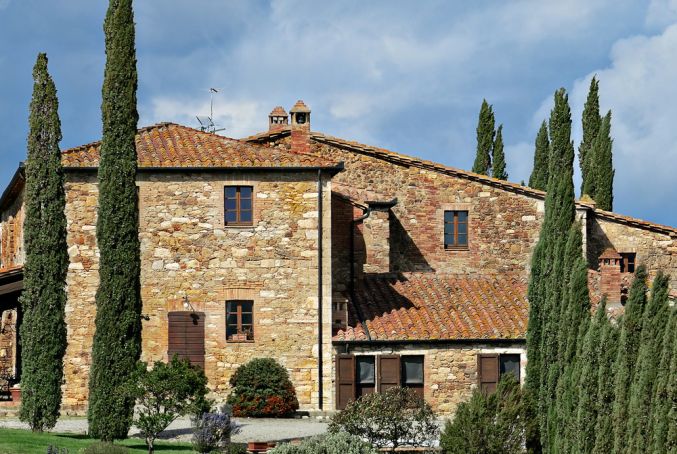How to buy a house in Italy
A guide to the contracts and taxes involved in purchasing a property in Italy.
Many people fall in love with Italy and dream about buying a home here. As in every country around the world, it is always a good idea to become familiar with the customs, laws and regulations about purchasing properties and the costs involved before getting started.
In Italy, real estate agents receive a commission from both the buyer and the seller. This is different from many countries where often only the seller pays the realtor a commission.
The commission can be between three to five per cent of the total sale + VAT (22 per cent, a mandatory tax added to the invoice). The Italian civil code states that realtors earn the commission when the offer has been accepted by the buyer, even if only verbally. The agent’s commission is usually paid on signing the preliminary contract.
Another thing to be aware of is that in Italy there is no such thing as an escrow account; the money does not go into a separate account to be held and then released to the seller at the closing. Each money transaction goes directly to the seller. Everything is documented and the agent and the notaio (notary public) provide testimony of all of the transactions taking place.
When viewing properties it is wise to ask for the registered floor plans (planimetria catastale) to see if there are any differences between what the registrar’s office has on file and what is actually for sale.
Your notary will often do this for you. It is relatively common to see differences from the registered floor plans; for instance, there may be an extra bathroom or bedroom in the property which is not visible on the official floor plans. This is important if the buyer has to request a bank loan to purchase the property, because the bank will send an inspector to the property. If there are any differences, the bank may not offer the full amount of the loan requested.
If differences are discovered, for example if a previous owner has built an extension which does not show on the registered plans, then the buyer takes on the responsibility for any fines or administrative fees due if or when the undeclared modification comes to light, perhaps during a future sale.
Written offer

Once a buyer has chosen a property, a written offer must be made to the real estate agency’s office and should specify the purchase amount and the time-frame in which the buyer intends to make the payments.
The agency must also inform the buyer if the seller has a mortgage on the property and, if so, how much is left to pay off. The buyer should also demand to see the visura catastale, the municipal document showing proof of ownership. The buyer may also request to see the deed or title (atto di vendita).
When making an offer, the buyer is required to leave a cheque for between €5,000 - €10,000 depending on the sale price, which is a financial commitment on the buyer’s part to hold the property. This must be in the seller’s name and the agency keeps it until the offer has been accepted. At this point the buyer should have in writing the agency fees too. The offer should also have an expiration date, meaning that the agency will stop showing the property to other clients until that date.
Offer accepted
Once the offer has been accepted, the agent can give the cheque to the seller to cash, unless the buyer needs to request a bank loan or mortgage, and the sale is thus dependent on the outcome. It is to the buyer’s advantage to make sure the agent keeps the cheque until the bank has confirmed the loan. If the buyer pulls out of the deal, he/she forfeits the deposit; if the seller pulls out, he/she must pay the buyer double the amount of the deposit.
The date for the preliminary contract (compromesso) is then scheduled. This can be done at the real estate agency or by a notary public. Generally, 10 to 20 per cent of the sale price is paid at this time.
The preliminary contract should state that the deposit or down payment made on this day is a caparra confirmatoria, a term used as protection for the buyer.
Before the preliminary date it is wise to ask for any additional documentation such as the official document from the municipal technical office (ufficio tecnico comunale) stating that the building has all of the permits required by law, or a statement from the building administrator confirming that all of the previous condominium expenses (ordinary and extraordinary) have been paid.
Each party will have a signed copy of the preliminary contract which specifies all of the steps involved. The estate agent’s fee is paid on the day of the preliminary contract.
The preliminary contract has to be registered at the municipal registrar’s office within 20 days and the costs to register the contract are paid by the buyer. At this stage, a date for the closing or settlement (rogito) is agreed upon.
Property tax
The buyer has to pay all the costs of the notary, which will depend on the sale price of the property and whether the notary is being used for both the preliminary contract and the closing or only the closing.
If it is the buyer's first property in Italy and the buyer is resident in Italy, the property tax owed is less than if the buyer already has other properties in Italy or is non-resident. The taxes change from time to time so it is wise to ask the agent.
The property tax for a non-resident is higher, reaching as much as 10 per cent of the sale price. There are also other fees involved, so make sure you ask the agent what they are.
Visit the Agenzia delle Entrate (government revenue department) website, for costs for buying properties in Italy. (It is in Italian only, so you may need some help.) There is an area detailing official costs and tax relief in the section Agevolazioni per l'acquisto della prima casa.
Closing the sale
At the closing the buyer will sign the deed or title (atto di vendita), which must be registered within 30 days. The official deed is usually ready 45 days or so later.
Note that if the buyer is not fluent in Italian, a translator may be required. In this case, Italian law specifies that the deed or title is in both Italian and English (or the buyer’s language) and that the translator is mentioned in the deed or title. The buyer may choose the translator or ask the notary to provide one. There will be additional costs involved.
At the closing, the buyer will be given the keys to the property but will have to wait for the original copy of the deed or title before having full legal ownership of the property.
Italian bureaucracy is very complicated, so it is advisable to use English-speaking professionals throughout the transaction.
By Bonnie Rose-Zanni




















